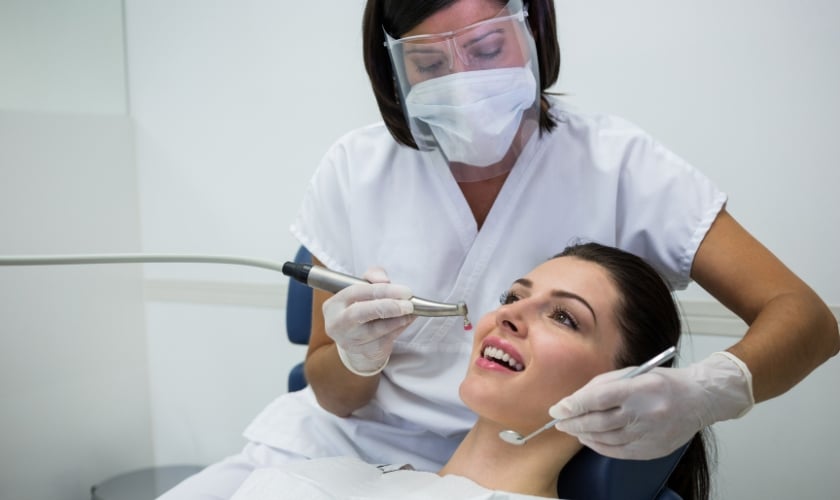ONLINE SCHEDULING AND VIRTUAL CONSULTS AVAILABLE

Will My Dental Crown Need Special Care Or Replacement Eventually?

A captivating smile is a powerful asset, and dental crowns play a significant role in preserving that asset by protecting and enhancing damaged teeth. Whether you’ve recently undergone a dental crown procedure or are considering one, understanding the care and potential replacement of these crowns is crucial for maintaining a radiant smile. In this blog, we’ll delve into the factors influencing the lifespan of dental crowns, signs that indicate the need for replacement, and essential tips for their care.
The Lifespan Of Dental Crowns
Dental crowns are crafted from durable materials such as porcelain, ceramic, or metal alloys, designed to withstand the pressures of daily chewing and biting. On average, a well-maintained dental crown can last between 10 to 15 years, but individual experiences may vary. Several factors influence the longevity of dental crowns:
- Oral Hygiene Practices: Regular brushing, flossing, and routine dental check-ups are vital for maintaining the health of your natural teeth and the longevity of dental crowns.
- Material Selection: The material used for your dental crown affects its durability. A dentist in Plantation will give you insight regarding the best material suited to your needs and budget.
- Dietary Habits: Avoiding excessively hard or sticky foods can prevent damage to dental crowns. Chewing on ice or using your teeth as tools can also contribute to premature wear.
- Bruxism (Teeth Grinding): Individuals who grind their teeth may experience quicker deterioration of dental crowns. A night guard recommended by your dentist can help alleviate this issue.
Signs Your Dental Crown Needs Attention
While dental crowns are designed to be robust, they aren’t immune to wear and tear. Paying attention to signs that may indicate issues with your crown is essential:
- Pain or Discomfort: Persistent pain or discomfort around your dental crown can serve as a crucial signal that something might be amiss. If you experience ongoing pain or discomfort, it is essential to bring this to your dentist’s attention promptly.
- Chips or Cracks: The durability of dental crowns is impressive, but they are not invincible. Any visible damage, such as chips or cracks, should be addressed promptly to prevent further deterioration. Even minor damage to the crown can compromise its effectiveness and expose the underlying tooth to potential issues.
- Sensitivity: Increased sensitivity to hot or cold temperatures can be more than just a passing discomfort—it might indicate a problem with your dental crown or the tooth beneath it. If you are wincing at hot or cold foods and beverages, discussing this with your dentist is crucial.
- Looseness: Discovering that your dental crown feels loose or unstable is critical and requires immediate attention. A loose crown compromises its functionality and poses risks for potential complications. If left unattended, a loose crown can lead to further
Special Care For Dental Crowns
Oral Hygiene Routine
Maintaining a consistent oral hygiene routine is paramount to the health and longevity of your dental crown. Brush your teeth at least twice daily with fluoride toothpaste to remove plaque and bacteria. Flossing regularly helps reach areas between teeth that brushing alone might miss. Integrate an antiseptic mouthwash into your routine to enhance oral hygiene, keeping your gums healthy and minimizing the risk of infections that could impact your dental crown.
Regular Dental Check-Ups
Proactive care is key to ensuring your dental crown’s longevity. Schedule routine dental check-ups with your dentist, allowing them to monitor the health of your dental crown and address any emerging issues promptly. Regular examinations can detect potential problems early on, preventing complications and ensuring the continued success of your dental crown.
Avoid Bad Habits
Certain habits can pose a threat to the integrity of your dental crown. Refrain from teeth grinding, a common habit that can accelerate wear and tear on your crown. Similarly, avoid biting on hard objects or using your teeth as tools, which can lead to chips or cracks in the crown. By consciously avoiding these habits, you contribute significantly to the long-term health of your dental crown.
Balanced Diet
A well-rounded and nutritious diet is pivotal in supporting overall oral health, including the longevity of your dental crown. Consume foods rich in vitamins and minerals, as they contribute to the strength of your teeth and surrounding structures. Additionally, limit the intake of sugary or acidic foods, as excessive consumption can contribute to decay and compromise the health of your dental crown.
Protective Mouthguard
A protective mouthguard can be a game-changer for individuals engaged in sports or those with a tendency to grind their teeth at night. Sports activities, especially contact sports, increase the risk of dental injuries. Wearing a mouthguard safeguards your dental crown and prevents potential damage. Similarly, if you experience bruxism (teeth grinding) during sleep, a custom-fitted nightguard can protect your dental crown from the effects of grinding, ensuring its longevity.
Your smile is an investment, and dental crowns are pivotal in preserving its beauty and functionality. By understanding the lifespan of dental crowns, recognizing signs that may indicate issues, and adopting proper care practices, you can ensure the longevity of your dental crown and maintain a healthy, radiant smile for years to come. Remember, regular communication with your dentist is key to addressing any concerns and ensuring the ongoing success of your dental crown.

